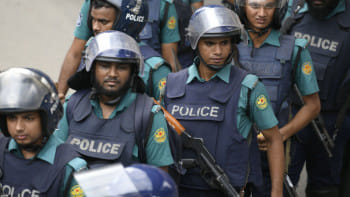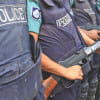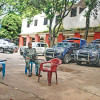We need inclusive and gender-responsive community policing

On June 27, 2024, a discussion titled "Towards Gender Equality: Gender-Responsive Community Policing in Bangladesh" was organised jointly by UN Women and The Daily Star at The Daily Star Centre. Academicians, top female police officers, legal specialists, and gender activists participated in the event. Below is a summary of the key points from the discussion.
Policing is crucial for maintaining peace, stability, and security in a society. However, with the ever-changing security challenges of this century, it is essential to ensure a community approach to policing, with a focus on inclusivity and gender sensitivity. This calls for more female representation in law enforcement.
One of the key benefits of having more female law enforcement officers is the building of trust and institutional credibility among community members, especially women and girls. According to a 2020 study carried out by UN Women, only 10 percent of the police forces in the Asia Pacific region are women. Within the Association of Southeast Asian Nations (ASEAN), women's representation in the police ranges from around 6 to 20 percent. The limited numbers of women's representation in the police can be attributed to certain perceptions of policing being a masculine job that demands physical strength, and gender norms and stereotypes regarding women's role in society and the definition of good law enforcement leadership.
To explore these challenges, UN Women Regional Office for Asia and the Pacific conducted a comprehensive assessment of the implementation of gender-responsive community-oriented policing (COP) in four countries—Bangladesh, Pakistan, Philippines, and Thailand—from September to December in 2023, in collaboration with the UN Standing Police Capacity (SPC).
On June 27, 2024, UN Women and The Daily Star organised a roundtable discussion, titled "Advancing Gender-Responsive Community-Oriented Policing in Bangladesh" to share the key findings of the study in Bangladesh. The discussion was held at The Daily Star Centre in Dhaka with a wide array of representation from the government, Bangladesh Police, UN agencies and other development organisations, academicians, and legal practitioners.
The study recognised the key elements in COP from a gender lens, namely community consultation with women, responding to the needs of women and other marginalised groups, women's participation for crime prevention and problem-solving, ensuring female leadership in both policy making and training for police, gender responsive action and accountability towards community. The study findings acknowledge the importance of legal and policy frameworks for COP to address diverse needs. Two national-level strategies are in the process of being finalised. However, given that The Police Act, 1861 is not updated according to modern policing standards, the aforementioned plans cannot be implemented properly, making it harder to institutionalise COP and women's participation in it.
Then comes the issue of representation. Women are underrepresented in law enforcement. As of April 2024, female police personnel constitute only 8.63 percent of the total police in Bangladesh, according to the Bangladesh Police Women Network (BPWN) website. Speakers at the roundtable highlighted the different needs of women—like maternity leave, availability of toilets for female police staff—in the remote posting areas, which require investments. While they are expected to excel in their jobs, their reproductive and caregiving responsibilities are not considered. Deploying female officers in remote areas has become a challenge due to mobility and security concerns that also hinder them from taking challenging assignments despite their willingness.
To combat these challenges, speakers recommended incorporating a gender lens to analyse requirements that are needed to recruit women in the police force and an intersectional approach to consider multiple other sets of challenges arising from age, class, ethnicity, and geographic locations. There should be impact analyses of relevant policy frameworks after implementation.
While discussing the current challenges in the COP, speakers also pointed out that in urban areas, COP committees see an underrepresentation of marginal women. However, data from the police personnel present at the roundtable shows that there are over 49,000 Community Policing Forums (CPFs) in the country and female participation is significantly higher at the district level compared to Dhaka. Police organise four open houses every year with these committees, where female participation has increased from 26 percent in 2022 to 33 percent in 2024 so far.
Meanwhile, the police department remains severely understaffed, which makes it even harder for the existing workforce to deal with cases with gender sensitivity. 38.83 percent of the online survey participants in the UN Women's 2023 study thought gender sensitivity in daily work is important to a great extent and 25 percent thought it to be important to a limited extent. What's alarming is that 17.48 percent perceived this concept to be entirely irrelevant to their policing work.
Survey results also reveal that 84 percent of the participants believe that Bangladesh Police has taken adequate measures to ensure gender sensitisation among police personnel, while 65 per cent mentioned receiving introductory training on COP. However, 70 percent of those who received training did not participate in COP activities in last two years. Those involved in community awareness-raising activities on gender-based violence, cybercrime, crime prevention etc account for 66.67 percent of the respondents, and 28 percent remain inactive on this front. Meanwhile, 13 percent of respondents are unaware of such activities.
Currently, the existing gender-responsive mechanisms include help desks for women, children, the elderly and persons with disabilities, and victim support centres. Speakers also highlighted non-functionality of these help desks in many areas and emphasised reviving the existing mechanisms of COP. Simultaneously, they have asked for more resources, capacity enhancement of community and beat police, and a close evaluation of gender-sensitive budgeting and its proper utilisation.
The study also identified some good practices in implementing gender-responsive COP in Bangladesh. For example, Bangladesh Police Women Network (BWPN) has launched an online gender-responsive training module, where field officers of different ranks can learn about gender-responsive policing and implement the learnings in their work. This initiative also made its place in the regional list of promising practices in the UN Women's study.
Speakers at the roundtable emphasised the importance of partnership among the police, NGOs, civil society and the general people to strengthen and institutionalise COP. They have also recommended introducing more inclusive practices in police training for inclusive service delivery, such as using sign language to help it become more accessible. There is an urgent need for political will to make policing more inclusive rather than an opportunity to abuse power. Police need to be more connected to women from the grassroots level, while BWPN needs to align itself with civil society and women's movements to achieve the goals of gender-responsive policing, according to the speakers at the roundtable.
Recommendations
● A comprehensive national-level COP strategy should be implemented
● Existing COP mechanisms need to be strengthened
● Women and other marginalised communities need to be given access to COP activities and related information
● The safety of female police officers in remote and crisis-prone areas should be ensured to increase meaningful participation
● More capacity enhancement training for police should be facilitated, including a focus on gender-sensitive attitude and behaviour
● There should be a close evaluation of gender-responsive budgeting and its proper utilisation
● Impact analyses of policies need to be ensured
● It is critical to continue with the advocacy on redistributing household duties and caregiving work.
● Inclusive practices like using sign language in COP training should be introduced There should be an intersectional approach to ensure the representation of all age groups, classes, and ethnicities
Follow The Daily Star Opinion on Facebook for the latest opinions, commentaries and analyses by experts and professionals. To contribute your article or letter to The Daily Star Opinion, see our guidelines for submission.

 For all latest news, follow The Daily Star's Google News channel.
For all latest news, follow The Daily Star's Google News channel. 











Comments